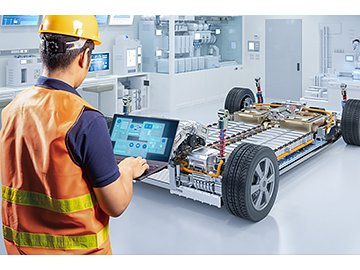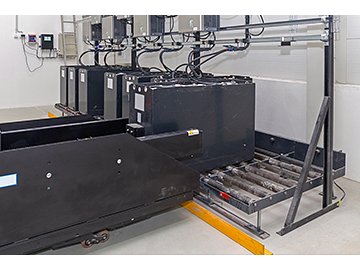Large Lithium-Ion Batteries, Parts 1-6 (US) (IACET=0.2)
English
30-Day Money Back Guarantee
Full Lifetime Access
Self-Paced
Finish in
116 mins!
Finish in
116 mins!
Made for for
Employees
only
Employees
only
No Certificate
Provided
Provided
Mobile -
Friendly
Access
Friendly
Access
What you'll learn
Large Lithium-Ion Battery Systems Part 1 of 6: Introduction
Large Lithium-Ion Battery Systems Part 2 of 6: Safe Handling
Large Lithium-Ion Battery Systems Part 3 of 6: Safe Transportation (US)
Large Lithium-Ion Battery Systems Part 4 of 6: Safe Storage
Large Lithium-Ion Battery Systems Part 5 of 6: Safe Disposal (US)
Large Lithium-Ion Battery Systems Part 6 of 6: Incident Preparedness and Response Planning
Skills covered in this course
Description
Lithium-ion batteries provide power to devices that we use every day, from smartphones and computers to electric vehicles and energy storage systems. However, improper handling, transportation and disposal of these batteries can pose serious safety risks including fires and explosions. Take the courses in this suite to learn about the importance of safely using, handling, transporting, storing and disposing of lithium-ion batteries so that you can mitigate potential hazards to people, property and the environment. In addition, this suite will cover emergency response protocols in the event of a battery-related incident. The courses in this suite are ideal for battery manufacturers and frontline workers, shipping and receiving staff, warehouse staff, engineers, installers, service technicians and other personnel who interact with lithium-ion batteries.
Author
UL empowers organizations to protect the well-being of workers, reduce risk, improve productivity, enhance compliance, and drive measurable business improvement through its learning, health, and safety platforms. More than 2,000 organizations in over 20 major industries including manufacturing, pharmaceutical, healthcare, and construction & energy, trust UL’s software tools and learning solutions to meet their expanding needs. UL's international suite of online courses, built by industry experts and learning specialists, give employees the skills and knowledge they need to stay safe, succeed on the job, and remain in compliance.
Large Lithium-Ion Batteries, Parts 1-6 (US) (IACET=0.2)

Large Lithium-Ion Battery Systems Part 1 of 6: Introduction
Large lithium-ion battery systems provide power to electric vehicles, computer data centers, commercial and residential energy storage systems, and other heavy-duty purposes. If not handled correctly, these batteries can cause fires or explosions that cause injury and damage to property. Take this course to learn about the different types of lithium batteries, how lithium-ion batteries work, their potential hazards and the importance of third-party certification. This course is ideal for battery manufacturers and frontline workers, shipping and receiving staff, warehouse staff, engineers, installers, service technicians, and other personnel who interact with lithium-ion batteries.

Large Lithium-Ion Battery Systems Part 2 of 6: Safe Handling
Although lithium-ion battery incidents are very rare, when they occur, the failure can be rather spectacular, particularly for large lithium-ion batteries. Even batteries from well-known manufacturers can have quality problems, and care must be taken when handling them. Take this course to learn about safe handling practices for large lithium-ion batteries, as well as the different causes of damage and the steps to take if you suspect a battery may be damaged. This course is ideal for battery manufacturers and frontline workers, shipping and receiving staff, warehouse staff, engineers, installers, service technicians, and other personnel who interact with lithium-ion batteries.

Large Lithium-Ion Battery Systems Part 3 of 6: Safe Transportation (US)
Lithium-ion batteries are more energy dense than ever, which brings greater risk if not managed correctly. These batteries can pose unreasonable risk to health, safety and property when improperly transported in commerce. Take this course to learn about the requirements for safe transportation of lithium-ion batteries by ground, air and water. This course is ideal for battery manufacturers and frontline workers, shipping and receiving staff, warehouse staff, engineers, installers, service technicians, and other personnel who interact with lithium-ion batteries.

Large Lithium-Ion Battery Systems Part 4 of 6: Safe Storage
Lithium-ion batteries are safe, but as with all batteries, proper storage conditions must be met in order to maintain safety and prevent incidents. If stored improperly, batteries may become damaged and unusable, or even dangerous. Improperly stored lithium-ion batteries may start a fire or contribute to the spread of a fire. Take this course to learn about the guidelines for safely storing lithium-ion batteries. Ideal learners are battery manufacturers and frontline workers, shipping and receiving staff, warehouse staff, engineers, installers, service technicians and other battery manufacturing personnel who interact with lithium-ion batteries.

Large Lithium-Ion Battery Systems Part 5 of 6: Safe Disposal (US)
Lithium-ion batteries can be a fire hazard even when they are no longer useful in powering equipment and products. Lithium-ion batteries for disposal are considered hazardous waste and must be disposed of properly to avoid harm to people, property and the environment. Take this course to learn about the regulations that govern safe environmental management and disposal of lithium-ion batteries, disposal options, and how to prepare batteries for disposal. Ideal learners are battery manufacturers and frontline workers, shipping and receiving staff, warehouse staff, engineers, installers, service technicians, and other personnel who interact with lithium-ion batteries.

Large Lithium-Ion Battery Systems Part 6 of 6: Incident Preparedness and Response Planning
While lithium-ion batteries provide an effective and efficient source of power, the likelihood of them overheating, catching on fire, and even leading to explosions increases when they are damaged or improperly used, charged or stored. When incidents happen, it's important that you are prepared to handle them. Take this course to learn what you can do to prepare for an incident involving lithium-ion batteries. This course is ideal for manufacturers and frontline workers, shipping and receiving staff, warehouse staff, engineers, installers, service technicians and other personnel who interact with lithium-ion batteries.






